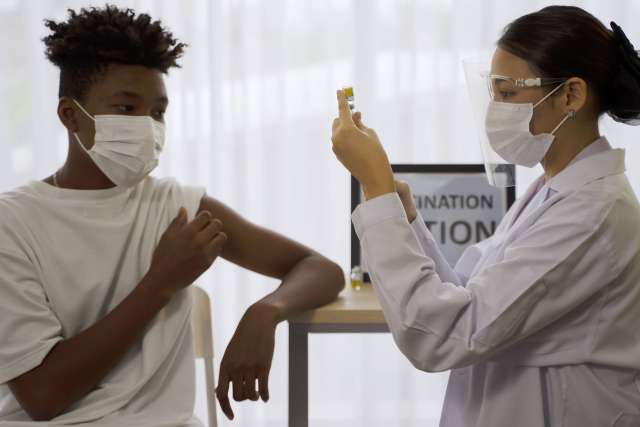The first day of school is here, the Delta variant is surging and health officials say the best way to protect against COVID-19 are vaccines – which still aren’t approved for children under 12.
When will kids be able to get a COVID-19 vaccine? Are there safety risks to worry about? What precautions should families take when schools reopen their classrooms?
Parents and guardians are left with these and many other questions.
Here, Annabelle de St. Maurice, MD, MPH, a pediatrician and co-chief infection prevention officer at UCLA Health, sheds light on the status and safety of COVID-19 vaccines for children.
The U.S. Food and Drug Administration urged Pfizer and Moderna to increase the number of volunteers in vaccine trials for children ages 5 to 11. What does this mean and how might it affect the availability of vaccines for this age group?
There are certain numbers of trial participants that the FDA feels are needed to see any safety concerns — the more children you enroll, the more likely you are to find rare events that might not be found in a smaller trial.
However, enrolling more children means Pfizer and Moderna have more children to observe as they track outcomes. The larger trial sizes may delay emergency-use authorization for those vaccines in children under age 12. That authorization was originally expected in the fall; now it could be 2022.
What do we know about how children spread COVID-19?
It was initially thought that children only rarely transmitted the virus. We now know that transmission may vary by age group. Children younger than 5 tend to be infected less than children older than 5, but they can still transmit COVID-19 to adults and to each other.
Still, studies have found that most transmission in schools was from staff member to staff member, rather than student to teacher or student to student.
If a child was to contract the virus at school, could they potentially spread it to others in their household?
Children can transmit to adults, and they can also get infected by other family members or staff at the school or other students.
The best way to protect your family is for all those eligible to get fully vaccinated. If your children are eligible for the vaccine, they should get vaccinated as soon as they can.
What about for children younger than 12? They aren’t eligible for the vaccine, yet in-person school is resuming. Should parents opt for remote learning for these kids?

Fortunately, we have a lot of data from schools at this point in the pandemic. What has been demonstrated is that transmission rates in schools typically tend to be lower than, or similar to, transmission rates in the community. Even if there are high rates of transmission in the community, your child going to school does not increase their risk of getting COVID-19 as long as prevention measures are followed.
By now, schools are very familiar with those prevention measures and have a solid system in place to prevent transmission. I think it’s very important for children to go back to school for emotional and mental health and normal development.
Are side effects of the COVID vaccines different in children than adults? What about the heart inflammation that some young people have experienced after receiving the vaccine?
With the vaccines, the major difference that we've noticed in children compared to adults is that children are more at risk of inflammation around the heart muscles, known as myocarditis.
Some children who got myocarditis were just treated with anti-inflammatory medications. Others may have required stronger immune modulators like steroids. But most recovered, and did not have serious long-term effects.
The FDA and the Centers for Disease Control and Prevention reviewed those findings, and because it was so rare and was mild in most cases — and because COVID-19 can so severely affect children, adolescents and young adults — it was felt that the benefits of the vaccines far outweigh the risks.
Generally, the vaccine is very safe in children and adults.
Are there any concerns about kids and the long-term effects from vaccines?
There’s no evidence that there’s any long-term consequences from vaccines.
The vaccines that have been around since most of us were young children have been looked at in the long term to see if they increase the risk of auto-inflammatory disease, cancer, things like that.
CDC and other public health researchers will continue to track the short- and long-term safety of these vaccines in children and adults.
What else do parents need to know about vaccinating their children against COVID-19?
We’ve already talked about how children can spread COVID-19, but one misconception might be that children can’t get sick from COVID-19.
That’s not true: Children can get sick from COVID-19. They tend to have more mild illness than adults, but we’ve still seen (about) 500 deaths in children under age 18 (nationally).
Additionally, there are some long-hauler symptoms that can be seen in children, such as loss of taste or smell, shortness of breath, difficulty concentrating and memory problems. There’s also multisystem inflammatory syndrome in children, MIS-C, that presents with things like shock, inflammation and fever that occur after infection with COVID-19. These are all reasons to protect your child.
Related articles
Back to school: It's almost time to return to the classroom - but is it safe?
Breakthrough COVID cases: What we know so far
Back to school: LGBTQ+ students lost some support networks during the pandemic




